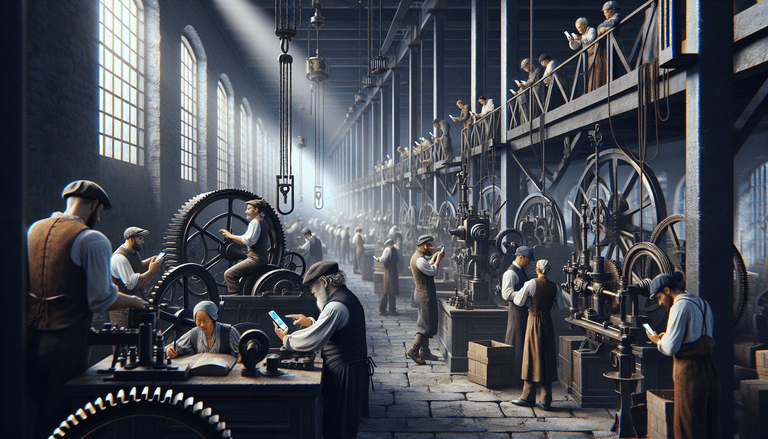Once upon a time in the heart of the 18th century, a little something known as the Industrial Revolution kicked off, a rollicking ride that would change the way we crafted the world. You know, from water wheels to steam engines, this was an era of grit, grime, and determination, peppered with the relentless hum of machinery. Now, what if we cranked up that mechanised symphony with a touch of the 21st century's glittering gems: smartphones?
Imagine, if you will, the factory floors bustling with workers, each one clutching a shiny new iPhone or Android device, buzzing like bees with notifications. The air, already thick with the scent of industry, now carrying the unmistakable chime of text messages and app alerts. Oh, the industrialists would have found their pockets a bit lighter, given the potential for distraction, Angry Birds would surely have caused more than one cotton mill to pause its wheel-spinning!
Networking on the factory floor
Back in the day, communication was about as fast as a snail on a leisurely afternoon stroll. Letters and word of mouth were the tweets of the times. But with smartphones clutched in every soot-stained hand, swift information sharing would have made even the grandest chain reaction seem sluggish.
Factories that relied on a baroque concert of bells, whistles, and foremen's shouts would now dance to the digital beat of instant messaging. Telegrams? Oh, they would be as redundant as sending smoke signals from Big Ben. Perhaps a group chat for each production line, where the workers could buzz in with updates. "Oi, mate, another spindle’s gone wonky," one cotton-spinning Milton might text, brightening up the overall working day with a dash of emoji-laden camaraderie.
Apps and assembly lines
With endless apps at the industrialists' fingertips, optimising productivity would become as simple as swiping right on a dating app. Need to check the cotton yield? There's an app for that. Want to keep your ale suppliers in line with inventory needs? You guessed it, there's an app for that too. CRM systems suddenly don’t look quite so revolutionary, do they?
Imagine James Watt's engineering marvels being assembled with help from YouTube tutorials. "How to fix a steam engine in three easy steps" might've saved hours of fiddling and faffing. A quick Google search could save an inordinate amount of hair-tearing over stubborn machinery.
Social media powered protests
Of course, it wouldn't all be happy hashtags and productivity gains. The era wasn't without its strife, after all, and with the power of social media, protests could have surged with the speed and ferocity of a hurricane. Imagine the Luddites with trending hashtags like #SmashTheFrames or #WeAreNotMachines bristling through the ether, gathering sympathisers like bees to a honeypot.
Factory owners would've had their hands full, not just with advancing machinery, but with managing their social media presence. "How to handle a PR disaster in the age of raging workers" might have been a hot topic on everyone's Pinterest board. Syncing social accounts with crisis communication strategies, what a delightful recipe for disaster (and possibly tea)!
Global markets in their pockets
Now, let us turn our attention skyward, and by that, I mean the spinning globe. In our modern-enlightened parallel world, Sir Richard Arkwright and his ilk wouldn’t just be captains of industry; they’d be globe-trotting entrepreneurs with orders sent over international waters with a few taps of their screen.
Want to trade with France post-haste? Merci beaucoup, just FaceTime! Need to verify the quality of rubber from afar? Well, Skype those suppliers. Global expansion wouldn’t require a fleet but merely a full charge and decent 4G. Victorian zigzags to distant shores were all well and good, but instantaneous international trade, now that really revs the engine.
The revolution's end... or the beginning?
As we unravel our speculative yarn, it's clear that pairing the steam-chugging rigour of the Industrial Revolution with the glossy sophistication of smartphones would have shaken history to its very cogs.
Would this techno-historical mash-up have sped up the progress, giving birth to even more remarkable innovations? Or perhaps it’d have steered the industrious vessel into the uncharted waters of distraction and chaos? Only in Timewarp Terry's delightful daydreams can we know for sure.
For now, dear readers, keep pondering these curious realities with a knowing grin. After all, in this tapestry of time and technology, there's no limit to where our imaginations might wander, except, perhaps, where there is no Wi-Fi!







